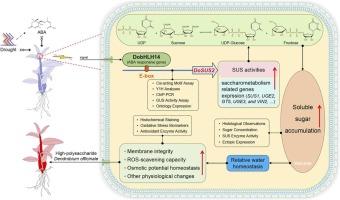胁迫响应型蔗糖合成酶基因DoSUS2促进铁皮石斛可溶性糖积累
IF 6.2
1区 农林科学
Q1 AGRICULTURAL ENGINEERING
引用次数: 0
摘要
铁皮石斛(Dendrobium officinale),特别是丹霞品种,生长在夏季高温和降雨有限的恶劣环境中,这些条件促进了生物活性多糖的大量积累。蔗糖合成酶(SUS)在调节蔗糖代谢和分解代谢中起着不可或缺的作用,在植物抗逆性中起着至关重要的作用;然而,对其在铁皮石斛逆境适应中的作用仍知之甚少。在这项研究中,我们证明了非生物胁迫通过诱导D. officinale(简称DoSUS)中SUS基因的转录激活来增强可溶性糖的积累。鉴定并鉴定了4个DoSUS基因,并将其分为三个不同的亚类(SUS I, SUSⅡ和SUS III),这表明它们具有不同的功能作用。其中,DoSUS2表现出组织特异性表达模式,对干旱胁迫和外源脱落酸(ABA)处理反应显著。DoSUS2在拟南芥中的异源表达显著提高了拟南芥的耐旱性和ABA耐受性,增强了可溶性糖的积累,提高了活性氧(ROS)清除能力。此外,转录因子DobHLH14被发现直接结合到DoSUS2启动子的E-box motif上,可能参与了一个涉及DoSUS2、DoSUS1、DoGT5、DoUGE2、DoUGE3和DoVIN2的糖代谢调节网络。总的来说,这些发现描绘了一个机制模型,其中DoSUS2调节糖代谢以增强D. officinale的应激耐受性。该研究进一步加深了对干旱适应分子基础的认识,为选育适合干旱环境的高多糖铁皮石斛品种提供了理论基础。此外,鉴定的DobHLH14-DoSUS2模块是同时提高逆境耐受性和多糖产量的有希望的遗传靶点。本文章由计算机程序翻译,如有差异,请以英文原文为准。

Stress-responsive sucrose synthase gene, DoSUS2, improves soluble sugar accumulation in Dendrobium officinale
Dendrobium officinale (D. officinale), particularly the Danxia cultivar, thrived in harsh environments characterized by intense summer heat and limited rainfall, conditions that promoted the substantial accumulation of bioactive polysaccharides. Sucrose synthase (SUS), which played an indispensable role in modulating sucrose metabolism and catabolism, was crucial for plant stress resistance; however, its function in the stress adaptation of D. officinale remained poorly understood. In this study, we demonstrated that abiotic stress enhanced the accumulation of soluble sugars by inducing the transcriptional activation of SUS genes in D. officinale (referred to as DoSUS). Four DoSUS genes were identified and characterized, and their classification into three distinct subclasses (SUS I, SUS Ⅱ, and SUS III) suggested diverse functional roles. Among them, DoSUS2 exhibited a tissue-specific expression pattern and a marked response to drought stress and exogenous abscisic acid (ABA) treatment. Heterologous expression of DoSUS2 in Arabidopsis thaliana significantly improved drought and ABA tolerance, enhanced soluble sugar accumulation, and increased reactive oxygen species (ROS) scavenging capacity. Furthermore, the transcription factor DobHLH14 was found to directly bind to the E-box motif in the DoSUS2 promoter, potentially contributing to a saccharometabolism regulatory network involving DoSUS2, DoSUS1, DoGT5, DoUGE2, DoUGE3, and DoVIN2. Collectively, these findings delineated a mechanistic model in which DoSUS2 modulated saccharometabolism to enhance stress tolerance in D. officinale. This study advanced our understanding of the molecular basis of drought adaptive and provided a theoretical foundation for breeding high-polysaccharide D. officinale varieties suited to arid environments. Moreover, the identified DobHLH14-DoSUS2 module represented a promising genetic target for simultaneously improving stress tolerance and polysaccharide yield.
求助全文
通过发布文献求助,成功后即可免费获取论文全文。
去求助
来源期刊

Industrial Crops and Products
农林科学-农业工程
CiteScore
9.50
自引率
8.50%
发文量
1518
审稿时长
43 days
期刊介绍:
Industrial Crops and Products is an International Journal publishing academic and industrial research on industrial (defined as non-food/non-feed) crops and products. Papers concern both crop-oriented and bio-based materials from crops-oriented research, and should be of interest to an international audience, hypothesis driven, and where comparisons are made statistics performed.
 求助内容:
求助内容: 应助结果提醒方式:
应助结果提醒方式:


